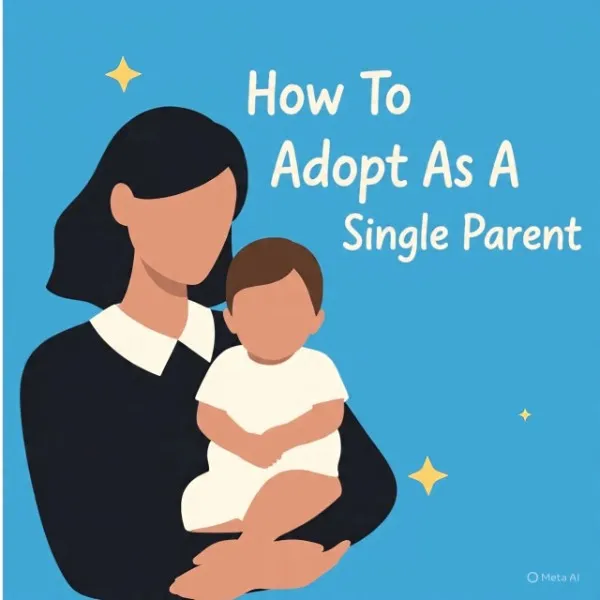Adopting As A Single Parent: 9 Ultimate Myths Demystified

“Adopting as a single parent is not possible.” This statement is one of the widespread and harmful misconceptions in the adoption world today. The reality is quite different from this damaging myth.
Adopting as a single parent is not only possible now but has also become more common and successful. Recent adoption statistics show that over 25% of all adoptions in the United States were done by single parents, and this number has been on a progressive rise each year.
These dedicated people create loving, stable homes for children who need them the most. They prove the fact that family structure is not more important than love, commitment, and the resources a parent can provide.
Adopting as a single parent does have unique challenges and it also offers incredible opportunities for both the parent and the child. Single adoptive parents often report having very deep connections with their children.
They enjoy greater flexibility when it comes to decision-making and the rewarding feeling of knowing they’ve made a life-changing difference in a child’s life.
This guide will dispel nine of the most persistent myths about adopting as a single parent. It will explore common challenges, highlight all the mistakes to avoid, and provide you with actionable strategies to help you succeed.
Therefore, whether you have just decided to start an adoption journey or have already gone deep into the adoption process, this post is for you, as I will reveal to you all the truths behind these myths, as they will help you make the best choices and pursue your dreams of parenthood boldly.
Myth 1: Single Parents Are Not Allowed to Adoption
One of the commonest misconceptions about adopting as a single parent is that laws prevent single individuals from adopting children. This is simply not true. Adoption laws around the world have changed significantly in recent decades, recognizing that loving, stable homes take many forms.
In the United States, all 50 states legally allow adoption by single parents. The focus is on the applicant’s ability to create a safe, perfect environment, not their marital status.
Many countries, including Canada, the United Kingdom, and Australia, have similar inclusive policies. International adoption agencies have also become more open to single parents. Countries like China, Colombia, and several Eastern European nations actively welcome single adoptive parents.
Progressive adoption agencies now highlight their services to single individuals, because they now see them as the most valuable resources for children in need.
Organizations like the Dave Thomas Foundation for Adoption and the National Adoption Foundation are ready to support those that considering adopting as single parents. They also offer them resources and guidance throughout the process.
Myth 2: Children Do Not Thrive Without Two Parents:

Research consistently shows that a child’s well-being relies more on stability, consistency, and love than on family structure.
Several recent studies show that no remarkable differences in academic achievement, social development, or emotional health between children raised by single parents and those in two-parent homes.
A study published in the Journal of Marriage and Family revealed that adopted children in single-parent households had similar emotional adjustment and academic performance as their peers in two-parent adoptive families.
What matters most is the quality of parenting, not the number of parents. Adopting as a single parent is just as valid as any other family structure.
Consider Julie, a single teacher from Oregon who adopted two siblings from foster care.
Five years later, those children are honor roll students involved in sports and community service. These children became very successful because Julie has been consistently present for them and fully committed to their growth and happiness.
This example not only shows why adopting as a single parent is thriving, but also shows how dedicated single parents are in providing everything children need to thrive.
Myth 3: Financial Stability Is Impossible for Single Parents:
While single parents may have some financial stress during the adoption process, the lie that they cannot reach adequate financial stability for adoption is baseless.
Adoption agencies evaluate financial stability based on the ability to meet a child’s basic needs, not on having two incomes.
Most adoption agencies indeed want to ensure there’s steady employment and a steady flow of income, however, many people are not aware that these requirements are often more flexible.
The average cost of adoption ranges from $2,000 for foster care adoption to $40,000 for private domestic adoption. But there are many financial assistance options out there for anyone pursuing adoption as a single parent.
There are also federal and state adoption tax credits that can provide you with up to $14,890 per child, isn’t that wonderful? Additionally, organizations like Help Us Adopt and Gift of Adoption offer grants for support.
Many employers also provide adoption benefits, which can help you cover remarkable expenses. Additionally, Pre-adoption budgeting strategies, like having a dedicated savings account and careful expense planning, can help make adopting as a single parent financially possible for you, especially if your income is moderate.
Myth 4: Adoption Agencies Prefer Couples Over Singles:
Modern adoption practices are to ensure the adoptee has the best during and after adoption, so agencies are now increasingly on the lookout for single parents who can provide great homes.
While some agencies may have their preferences, the adoption landscape has undoubtedly gravitated towards inclusivity, which has made adopting as a single parent easier and more accessible than ever.
The latest statistics on adoption accentuate this change: single-parent adoptions have risen by over 15% in the last decade, showing growing agency acceptance and support. Many agencies currently prefer single adoptive parents, especially for older children, sibling groups, and children with special needs.
The most important thing for you to do now as a single prospective adoptive parent is to research agencies that promote inclusivity, and note that organizations like Bethany Christian Services, Holt International, and many state foster care systems have clear policies welcoming those interested in adopting as single parents.
Spend time reading agency mission statements, reviewing their success stories, and most importantly, speaking directly with social workers, because that can help you identify the most supportive agencies for your journey.
Myth 5: Adopted Children Will Miss Out on Role Models
Children must not live with two parents to find their role models and influences. Single adoptive parents have a way of building strong networks of mentors, extended family, and community connections. These relationships offer children different perspectives and support, showing that single-parent adoption can provide ample resources.
Strong social networks naturally form around single-parent families. Grandparents, aunts, uncles, family friends, teachers, coaches, and community leaders all play a role.
These relationships can be more intentional and meaningful than those found in traditional nuclear families because single parents actively seek out positive influences for their kids.
Successful single adoptive parents suggest joining parenting groups, adoption support networks, and community organizations early on.
Programs like Big Brothers Big Sisters, youth sports leagues, religious communities, and neighborhood associations create structured ways for children to connect with additional adult role models who offer guidance, support, and friendship during their development.
Myth 6: Work-Life Balance Makes Parenting Alone Impossible
Balancing work and parenting is tough for any parent, but those who adopt as single parents find effective ways to manage both. The secret is to carefully plan for it, offer flexible work options, and dependable childcare.
Many single adoptive parents negotiate flexible work schedules, remote work options, or family-friendly policies with their employers before adopting. More industries recognize the importance of supporting employee parents and offer benefits like flexible hours, job sharing, and compressed workweeks, making single parenting easier.
Consider Michael, a software developer who adopted his daughter when she was three. He arranged to work in such a way that he could work for only four ten-hour days, to enable him to have three full days each week to bond with her daughter and pursue his other activities.
He also took time to build strong relationships with reliable childcare providers and with detailed backup plans for work emergencies. These introspective steps he took helped him succeed at work and still be there for his daughter’s important moments and daily needs.
Myth 7: Only Certain Types of Children Are Available
Single parents have the same opportunities as couples during adoption, and they are free to adopt infants, toddlers, school-age children, teenagers, and sibling groups. While some private agencies or birth mothers may prefer two-parent families, many specifically look for single parents, making adoption viable for various child placement scenarios.
International adoption programs now welcome single parents, and in countries like China, Bulgaria, and Colombia, you can easily get streamlined processes for single adoptive parents like you. Domestic infant adoption is also available, and many agencies accept different families with different structures and birth mothers who choose single parents.
Foster-to-adopt programs also welcome single-parent families, because they found out that many children in care have benefited from the stability and attention provided only by single parents.
Being open to a range of ages, minor special needs, or sibling groups can speed up the adoption process and help children waiting longer for placement.
Common Challenges Faced by Single Adoptive Parents:

Adopting as a single parent can be deeply rewarding, but it’s also not without its unique challenges. It is therefore important that you recognize these difficulties on time so that they can help in preparing and setting realistic expectations for the journey ahead.
Financial stress is among the most obvious challenges you will face, so as a single parent, you must be ready to pay all adoption fees, including legal costs, and ongoing expenses related to raising a child without the support of a partner’s income.
Additionally, the emotional strain of parenting alone can be daunting, especially during difficult transitions or when dealing with challenging behaviors from adopted children.
Although societal bias is lessening, it still exists. Single parents may face questions about their motivations or doubts about their parenting abilities. They regularly deal with assumptions about their personal lives that couples might not encounter.
Time management becomes essential when juggling work, household duties, and quality time with kids without a partner to share daily responsibilities.
Statistics reveal that single adoptive parents are remarkably resilient. Over 85% report being satisfied with their adoption experience despite these challenges.
The focus should be on realistic preparation, strong support systems, and acknowledging that every family structure has its unique issues. Single-parent families often cultivate excellent problem-solving skills and close bonds that help them tackle challenges effectively.
Common Mistakes to Avoid in Single-Parent Adoption:
Being Aware of all common mistakes can help you avoid delays and emotional rollercoaster during this adoption journey. Learning from others’ experiences saves time, money, and heartache while enhancing the chances of successful placement.
One of the greatest mistakes you can make is to rush into the process without proper legal guidance. Adoption involves complex legal requirements that vary by state and type of adoption, and every single parent attempting to navigate these alone may face serious delays, added costs, or even failed placements.
Therefore, hire an experienced adoption attorney from the start to protect both your interests and those of the child and the adoptee.
One other common challenge when adopting as a single parent is not preparing well emotionally. Don’t make the mistakes of focusing too much on practical matters like finances and housing, and overlook your emotional readiness or the specific needs of adopted children.
Trauma-informed parenting training, counseling, and support groups are necessary when you are preparing for the realities of adoption.
Failing to secure reliable childcare early can lead to unnecessary stress later. Single parents need solid backup plans for work emergencies, personal illness, and unforeseen events.
Building relationships with trusted caregivers and emergency contacts before placement will ensure that you have smoother transitions and reduced anxiety.
Inadequate financial planning beyond adoption fees can cause ongoing stress. You must be ready to budget for regular expenses, like emergency funds, and potential lost work time during bonding periods.
Start developing some detailed financial strategies, and with extra buffers, it helps ensure you have long-term stability and peace of mind during this process.
Actionable Strategies for Successful Single-Parent Adoption:
To be successful in adopting as a single parent requires careful planning, solid support systems, and realistic preparation. This approach helps to improve outcomes for both parents and children significantly
Building a strong support network before adopting lays the groundwork for long-term success. This network should include your family members, close friends, adoption professionals, other adoptive parents, and community resources.
Having regular communication with this support system will provide you with emotional encouragement, practical help, and important perspectives during the trial time.
Having a budget and managing your finances well should make it easier for you to cover more than just adoption fees, but should also include ongoing childcare, education, healthcare, and emergency expenses.
Single parents need to have a separate account dedicated just for adoption, and also be ready to explore other available grants, tax credits, and create practical budgets, considering reduced work flexibility after placement.
Encouraging Statistics and Real-World Success Stories:
Current adoption statistics present an encouraging view for single prospective parents. According to The National Council for Adoption, there is about a 92% success rate for single-parent adoptions, with placement disruptions happening at rates similar to those of two-parent adoptions.
Take the story of Patricia, a nurse who successfully adopted three siblings from foster care over two years. She was pretty worried at first about how to handle multiple children alone, and that made her create structured routines, seek family support, and focus on building trust with each child.
Patricia testified that her three children are performing well in their academics and socially, and the oldest recently received a college scholarship. Patricia’s success has proven the facts that with proper planning, preparation, and commitment, anyone can overcome initial concerns about single parenting.
Global adoption trends also favor those considering adopting as single parents and countries like Sweden and Denmark report that more than 40% of their adoptions involve single parents. These programs have shown positive outcomes for years, and have contributed to greater international acceptance of diverse family structures.
Long-Term Benefits of Single-Parent Adoption
There are many reasons to adopt as a single parent, which are beyond just providing homes for children in need. It often creates an opportunity for families to connect with each other and teaches us important life lessons about being resilient and showing unconditional love.
It has been noticed that children adopted by single parents usually gain strong independence skills, maintain close communication with their parent, and appreciate the careful decision their parent made to create their family.
Many express feeling valued and wanted, understanding that their parent chose parenthood specifically for them.
People who successfully navigate the adoption process as single parents sometimes experience significant personal growth through the adoption process and their parenting journey.
They develop better problem-solving skills, increased empathy, and greater confidence in managing life’s challenges. Many people see adoption as the most important decision they’ve made, and it has exponentially changed their initial views on family, love, and what truly matters.
The social benefits of inclusive adoption practices extend to entire communities and they encourage acceptance of different families as well as challenge traditional ideas about what makes a family successful.
Children raised with the understanding that families come in many forms often grow into more accepting and inclusive adults.
Conclusion On Adopting As A Single Parent:
The idea that single parents can’t adopt successfully has been proven false by decades of research, numerous success stories, and the experiences of thousands of successful single-parent adoptive families.
In this post, I have answered some of the most pressing questions about adopting as a single parent, and we’ve found that to succeed in your adoption journey, you must learn to love, be stable, and most of all, be prepared and committed, regardless of marital status or family structure.
From legal access to financial feasibility, from children’s developmental outcomes to societal acceptance, evidence has proven the idea that adopting as a single parent is a viable and positive way to form families.
Single adoptive parents bring unique strengths to parenting, such as focused attention, thoughtful decision-making, and often strong preparation for the adoption journey.
The challenges of adopting as a single parent are enormous, but you don’t need to fret, because they can be handled with proper preparation, solid support systems, and realistic expectations.
The actionable strategies I exposed in this guide provide you with practical steps that will help you manage your finances, prepare emotionally, and get the full support you need to succeed in your adoption journey.
Most importantly, I want you to remember that the success of adoption is not about family structure but about the love, security, and opportunities provided to their children. Single parents always show that they can create nurturing homes where adopted children grow and thrive.
If you’ve dreamed of adopting as a single parent but let myths and misconceptions hold you back, now is the time to move ahead with confidence.
Search for agencies that support single parents, connect with your friends and neighbors who have gone through it, and start taking steps toward building the family you’ve always wanted.
Your future child is waiting for exactly what you can offer: a loving, committed parent ready to provide a permanent, secure home filled with opportunity and unconditional love.
Frequently Asked Questions:
What is the average cost of adoption for singles?
The cost of adopting a child varies a lot, and strictly it depends on many factors, which include the type of adoption you choose, the location, and, most of the time, the age of the child.
For example, foster care adoption usually costs approximately $2,000 $5,000, which is mainly for legal fees and home studies. Private domestic adoption ranges from $20,000 to $40,000, which includes agency fees, legal costs, and expenses related to the birth mother. International adoption costs between $25,000 and $50,000, covering agency fees, country requirements, and travel costs.
Many single parents find that foster-to-adopt programs are the most affordable. There are also grants and tax credits that can help reduce costs for other types of adoption.
What emotional preparation should single parents focus on?
Emotional readiness means being honest with yourself about your motivations. It also includes having realistic expectations about the challenges that adopted children might face.
Additionally, single parents considering adoption should prepare for the unique aspect of their situation. I recommend you go for counseling to learn adoption motivations, trauma-informed parenting classes, connecting with other adoptive parents, and developing stress management strategies.
Having in mind that most adopted children may have gone through issues like loss or trauma will help you know how to respond to behaviors and emotions that can arise during the adjustment period.
Do single parents have access to adoption subsidies or grants?
Yes, they do. There are so many financial assistance options available for adoptive parents. Federal adoption tax credits can offer up to $14,890 per child, with some states providing extra credits.
Yes, they do. Adoption grants from organizations like Help Us Adopt, Gift of Adoption, and religious groups can contribute between $500 $10,000 toward expenses. Many employers now provide adoption benefits that cover costs between $2,000 and $20,000.
Foster care adoption often comes with ongoing monthly subsidies and medical coverage, which makes it the most financially accessible choice for single parents.





